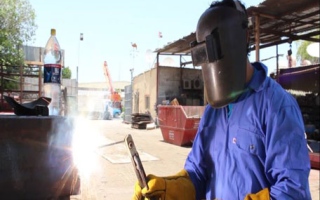- City Fajr Shuruq Duhr Asr Magrib Isha
- Dubai 04:20 05:42 12:28 15:53 19:08 20:30
The sharp fall in the value of the Indian rupee against the US dollar and the UAE dirham may have brought cheer to the Indian expatriate community here in the Gulf, but some are equally worried about the escalating cost of life back home.
Speaking to Emirates 24|7, Saliamma Scaria, General Manager, City Exchange LLC, a money exchange company affiliated to the State Bank of Travancore, said there is considerable increase in the number and volume of remittances through various exchange houses including City Exchange as the rupee touched an all-time low recently and is now seen stabilising.
“We are seeing increased crowd in our exchanges. Now we are planning to open two more branches in the UAE to take care of the increased remittance needs of the community. Even though the rupee is at very low rate, people should be cautious about borrowing indiscriminately to send money home. If they have loans or other liabilities back home, it is the right time to repay those loans,” she said.
Sudhir Kumar Shetty, Chief Operating Officer, UAE Exchange, said he was surprised by the steep decline in the value of the Indian currency, especially the unprecedented single-day fall on Tuesday, and attributes part of the fluctuation to undeliverable forward contracts and speculative positions taken by various parties in the foreign exchange market.
“Of course there is an increase in the remittances through our branches. The impact of a declining rupee looks good for the average expatriate, but due to inflation, especially the parallel inflation, their families back home will have to spend more money for the same goods and services,” Shetty said.
He said unless and until the Reserve Bank of India intervenes, the rupee fall may continue. After the RBI urged dollar sales by banks and corporates, the steep fall in rupee has been arrested.
“I am excited about the new rate, but it can be a temporary phenomenon. I am waiting and watching till my next salary. I have already sent my salary before the rupee fell,” said an Indian expatriate.
Expatriates who have lived here for three decades said they’ve seen the days when Dh500 used to fetch Rs1,000 at the remittance counter. At today’s exchange rate, one would get approximately Dh7,800 for the same Dh500.
“The average salary of a clerical staff used to be Dh1,000 in the UAE in the 1970s. The exchange rate then was low, but the prices of goods and services were equally low,” said an Indian expatriate resident who’s been in Dubai for over 35 years.
“The cost of a kilogram of rice used to Rs3, but now it is more than Rs35. A good meal was available for Rs15, now the same will cost Rs200 or Rs250,” he added.
“I used to get Rs2 for Dh1 in 1989, when I first came to Dubai, and now it has gone up several fold to Rs16 per dirham,” said another old-timer.
“Some expatriates are taking personal and credit card loans to remit money to be deposited in fixed deposits, but the increasing level of inflation and a depreciating rupee might eat into any gains t be made,” said an Indian financial expert.
“The rupee fall is tempting many expatriates to borrow and send money home. Our experience in the past shows that people have to be cautious about such calculations because they are entering a long-term liability for temporary benefit and borrow only if you are confident of repaying the loans on time and the job stability is ensured,” he said.
“I am not so excited about the rupee’s decline because I have two of my children studying in the UK. I have to spend more money for them to match the decline in rupee value. For all Indian students abroad, this is a slap on their face,” said Abubaker, an Indian accountant in the UAE. “If people are taking loans and credit cards to buy luxury items back home, they need to be careful,” he said.
“My salary in the UAE has remained static for the last five years. The price of mineral water sold through the store has almost doubled during this time, but I have been relieved by the decline in Indian Rupee. It is a welcome thing, even though a declining rupee is not good for my home country,” said Ajith, an Indian executive employed with a leading convenient store in the UAE.
“The decline in the rupee has tempted many Indians to take personal loans and credit cards to send money home. I receive about 200 calls per day for personal loans from various people, and recently the number of NRIs needing personal loans has gone up,” said a financial broker in Bur Dubai.
(Home page image courtesy Shutterstock)
ALSO READ:
Revealed: Kingdom Tower’s highest occupiable floor, observation deck level

Burj Khalifa resident recalls living with blue-collared workers, doing odd-jobs

Tarzan visits UAE to solve residents’ problems
![]() Follow Emirates 24|7 on Google News.
Follow Emirates 24|7 on Google News.